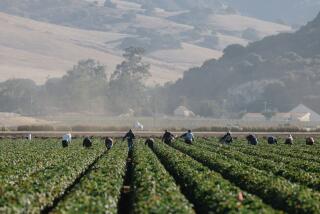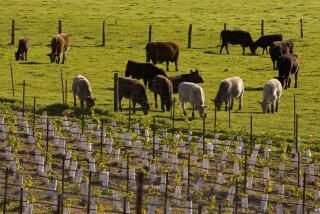Farmers see more red tape with food safety bill
WASHINGTON — Farming and ranching representatives appeared before a congressional panel Thursday to express concern that a major bill pending in the House could unnecessarily complicate the marketplace without improving food safety.
Amid recent health scares involving cookie dough and pistachios, the Obama administration has pledged to modernize the food safety system. Lawmakers are considering the Food Safety Enhancement Act of 2009, aimed at broadening the Food and Drug Administration’s powers.
The FDA currently regulates about 80% of the food supply, ensuring the safety of domestic and imported food products except for meat and poultry. The Food Safety and Inspection Service, part of the U.S. Department of Agriculture, is responsible for the remaining 20%, inspecting cattle, sheep, swine and goats before and after slaughter. The two agencies share responsibility for egg safety.
The proposed legislation would, among other things, give the FDA oversight of on-farm production activities, charge facilities an annual $500 registration fee, require additional record keeping, and expand FDA authority to quarantine geographic areas for food safety problems.
At Thursday’s House Agriculture Committee hearing, Maryland farmer Nick Maravell said added regulations and fees could be a tremendous burden.
Maravell, who has 170 acres of farmland, said his organic operation relied on crop and animal diversity -- Angus beef, chickens and turkeys, eggs from free-range chickens, and soybeans.
Having farmed organically since 1979, he said, he already maintains a huge file cabinet of paperwork to comply with inspections by state agencies and an organic certifier.
Maravell said his on-farm processing and direct-to-consumer system had never led to a food safety problem. Additional fees and regulations could deter the growth of small and diversified farms, which should be given incentives, not barriers, Maravell said.
Other witnesses stressed the importance of preventing food safety issues rather than merely confirming them through final-product testing.
Drew McDonald, vice president of national quality systems at Taylor Farms in Salinas, Calif., said final-product testing doesn’t improve food safety and, in some cases, punishes good facilities for their surveillance when a problem is found.
Taylor Farms is the world’s largest salad and fresh-cut vegetable processor, with 10 plants operating in six states and Mexico.
McDonald stressed the value of collaboration between industry and government, citing the California Leafy Green Products Handler Marketing Agreement, which was formed in 2007 after deadly outbreaks of E. coli was linked to spinach. The agreement sets science-based safety measures to reduce possible sources of contamination among state-grown leafy greens and is audited by USDA-trained employees of the California Department of Food and Agriculture, McDonald said.
He also criticized language in the bill that would let the FDA quarantine geographic areas where unsafe food originated or is located. He said the entire domestic tomato industry could have been under quarantine last summer if the provision had existed then.
Despite repeated claims from lawmakers and witnesses throughout the hearing that the U.S. food production system was the safest in the world, all agreed on the importance of improvement.
According to the Centers for Disease Control and Prevention, about 5,000 people in the U.S. die each year because of food-borne disease.
--
More to Read
Sign up for Essential California
The most important California stories and recommendations in your inbox every morning.
You may occasionally receive promotional content from the Los Angeles Times.










